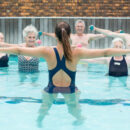Forgetfulness & Memory Tips
Be aware that some forgetfulness is quite normal. We all forget things occasionally at any age and it is normal to forget more often as you get older. What must be determined by your physician is the difference between normal memory loss and that which occurs when you have a more serious condition like age-associated memory loss impairment, dementia or Alzheimer's.

Be aware that some forgetfulness is quite normal. We all forget things occasionally at any age and it is normal to forget more often as you get older. What must be determined by your physician is the difference between normal memory loss and that which occurs when you have a more serious condition like age-associated memory loss impairment, dementia or Alzheimer’s.
Improve Your Memory With These 9 Common-Sense Techniques from John’s Hopkins
The minor memory lapses that occur with age-associated memory impairment can’t be eliminated completely; however, a number of common-sense strategies can improve overall memory at any age. The keys are to stay focused, active and alert.
Memory Tip 1: Place commonly lost items in a designated spot. If you’re prone to losing certain items, such as keys or eyeglasses, pick a spot and always put the items there when you are not using them.
Memory Tip 2: Write things down. If you have trouble remembering phone numbers or appointments, write them down and place the list in a conspicuous spot. Making a daily “to do” list will remind you of important tasks and obligations.
Memory Tip 3: Say words out loud. Saying “I’ve turned off the stove” after doing so will give you an extra verbal reminder when you later try to recall whether the stove is still on. Incorporating people’s names into the conversation immediately after you have met them helps, too.
Memory Tip 4: Use memory aids. Use a pocket notepad, cell phone, wristwatch alarm, voice recorder or other aids to help remember what you need to do or to keep track of information.
Memory Tip 5: Use visual images. When learning new information, such as a person’s name, create a visual image in your mind to make the information more vivid and, therefore, more memorable.
Memory Tip 6: Group items using mnemonics. A mnemonic is any technique used to help you remember. For example, when memorizing lists, names, addresses and so on, try grouping them as an acronym. Another mnemonic technique is an acrostic. Acrostics use the first letter of each item to create new words that form a sentence or phrase. Using rhymes or creating stories that connect each element to be remembered is also helpful.
Memory Tip 7: Concentrate and relax. Many environmental stimuli compete for your attention at any given time. To remember something, concentrate on the items to be remembered. Pay close attention to new information and try to avoid or block out distractions. Anxiety and stress can inhibit recall. Learning a relaxation technique, such as deep breathing or muscle-relaxing exercises, may help.
Memory Tip 8: Get plenty of sleep. During sleep the brain consolidates and firms up newly acquired information. Studies indicate that people are better at remembering recently learned information the next day if they have had a good night’s sleep.
Memory Tip 9: Rule out other causes of memory loss. If you suspect that you are having memory difficulties, consult your doctor. Some medical conditions can cause memory problems that can be corrected, including depression, hearing or vision loss, thyroid dysfunction, use of certain medications, vitamin deficiencies and stress. Many seniors are afraid they have Alzheimer’s when, in fact, they do not.









